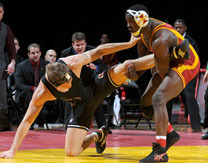Camping for a cause
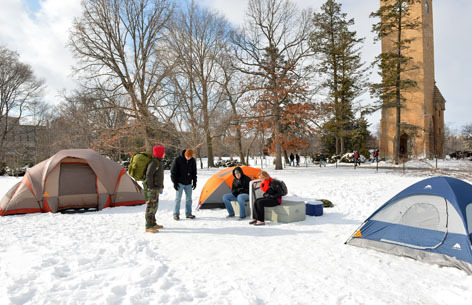
ISU Student Veterans of America members are camping out south of the campanile this week to increase awareness of homelessness among U.S. veterans and support the Department of Veterans Affairs' initiative to end veterans homelessness by 2015.
Club members will accept donations, including nonperishable foods that will be delivered to local food pantries (including the SHOP on campus). Monetary donations will go to the Emergency Residence Project in Ames and the Veterans Community Gratitude Fund, which assists student veterans on campus. Photo by Bob Elbert.
A local look at the federal sequester
Upwards of $260 million in federal funding – in the form of research grants, student financial aid and operating funds – was destined for Iowa State this year. That funding suffered a blow officially on March 1, a missed deadline for Congress to agree to a plan for reeling in the national debt. That failure triggered across-the-board cuts in the federal government set in motion by legislation passed in August 2011. In the current fiscal year alone, about 85 billion federal dollars will be cut. The long-term effects are less clear.
"We continue to communicate to our representatives in Washington how important these programs are to Iowa State University," said chief of staff Miles Lackey. "We hope they will get these funding issues resolved before the continuing resolution expires on March 27."
While nearly all the affected units at Iowa State await firm announcements from their federal funders – there's still uncertainty at the federal level about how the cuts will be determined -- campus leaders are contemplating their options with the best information available to them. Here's a quick look at how their plans are evolving.
Federally funded research projects
The slowdown in federal research funding already has begun. Through February, contract and grant dollars coming to Iowa State from federal agencies were down about 16 percent from last year. If that trend holds, the university would receive about $175 million in federal research funds this fiscal year – roughly $34 million less than in FY12.
Interim vice president for research and economic development David Oliver confirmed that federal agencies haven't shared firm funding plans yet, pending appropriations decisions for the rest of this fiscal year. Congress has a March 27 deadline to get that done. Oliver said federal agencies are hoping to be allowed to reshape or focus the cuts.
"The most information we're getting is from NSF (National Science Foundation), suggesting that continuing projects will keep their funding commitments and new grants will take the bulk of the cuts," he said. "Estimates tossed around are a 20 to 30 percent reduction in new grants funded."
Stay updated
The Society of Research Administrators International is maintaining an online Sequestration Resource Center.
Other federal agencies are "playing it close to their vests," said Rochelle Athey, director of Iowa State's Office of Sponsored Programs Administration. She said she too believes new funds are more at risk, but didn't count out the possibility that already awarded grants could be reduced if an agency's cuts are severe enough and research projects had not yet incurred some costs.
"What we're telling people is to keep spending their money and keep submitting proposals, with an eye on diversifying their submissions and considering non-federal funding sources," Athey said.
Oliver noted that while the research funding cuts are made award by award, the impact on the university will be a collective one. Two groups he expressed concern for are Ph.D. students and tenure-track assistant professors. New Ph.D. students are guaranteed five years of funding, three of which typically are in hand. In an environment of declining new grants, a significant number of graduate students will need to be funded from other sources, he said. Fewer grants also make new faculty members more vulnerable professionally, he said, once their startup funds are used and they need to transition to competitively awarded funds.
Oliver also offered this advice to researchers:
- Don't try to save money to carry into the future; these funds might be recaptured by the granting agency.
- Keep up to date on your grant proposals. When you receive a tentative acceptance, get all the paperwork done promptly to decrease the chance of the offer being lost.
- Stay in touch with your program manager and your budget.
U.S. Department of Energy's Ames Laboratory
Ames Laboratory receives about $39 million in operating funds from the U.S. Department of Energy. Following a national process of prioritizing science programs, Ames Lab leaders learned last week that none of its research programs are scheduled for cuts.
"This is a great testament to the quality, visibility and productivity of our research programs," said Ames Lab director Alex King in a message to his staff, "and it's the payoff for constant attention to those issues."
King said the Lab will sustain a 5 percent reduction to its safeguards and security budget, amounting to about $50,000, and a 50 percent reduction to its general plant projects budget (a reduction of about $300,000). These cuts amount to less than 1 percent of the Ames Lab annual operating budget.
He expressed confidence that the cuts can be absorbed without Lab-wide employee furloughs or layoffs, but said it will take some juggling. He said it's likely that some maintenance projects will be delayed.
Student financial aid
Iowa State will receive about $28.5 million this year in federal grant aid and work-study funds, about 80 percent of which is in the PELL grant program. All federal awards made to students for this academic year are secure, said director of student financial aid Roberta Johnson. And because it's a forward-funded program, PELL grant aid is safe for the 2013-14 year as well, she said.
Key spring dates
- March 27: Congress' September 2012 "continuing resolution" expires and it must pass appropriations bills for the federal government to function the rest of the current year
- April 15: Congress' deadline for adopting a FY14 budget
Johnson said the National Association of Student Financial Aid Administrators (NASFAA) estimated about a $37,000 reduction to Iowa State for 2013-14 in both federal work-study funds and Federal Supplemental Education Opportunity Grant funding, a grant for students with exceptional financial need. This amounts to roughly 4 percent and 6 percent reductions, respectively, to these two funding sources.
Johnson said she hasn't received specific information yet about some smaller federal grant programs.
"I'm working off the assumption that I'll have these two cuts next year," she said. "We're using the revised numbers for planning purposes."
Johnson said institutional support for financial aid has increased over the last few years in response to higher enrollments and increased financial need. That trend has helped offset eroding federal support.
"But it is unsustainable to assume that institutions can continue to absorb federal cuts while keeping their costs reasonable," Johnson said. "We are doing our best to minimize the impact on students."
Johnson's staff is preparing to send out financial aid award letters to incoming freshmen around March 28, and she said she doesn't anticipate having to mail out revised award letters. Final funding information from the U.S. Department of Education typically arrives before March 31.
Iowa Agriculture and Home Economics Experiment Station
The College of Agriculture and Life Sciences was to receive about $8.1 million in federal funds this year -- sometimes referred to as "formula" funds -- that are distributed annually to the nation's land-grant schools for research that is relevant to their states. At Iowa State, this is carried out under the umbrella of the experiment station.
"These funds are one of the things that link us to other land-grant universities and make the system work with greater efficiency," said dean Wendy Wintersteen. "They provide a great return on the investment, in part because they assure collaboration among the states."
Wintersteen said she hasn't received the official word yet from the U.S. Department of Agriculture (USDA), but Iowa's Congressional members advised her last week to plan for approximately a 5 percent reduction in funding for the current year, or about $414,000.
"We don't have the flexibility in our budget to absorb that, so we will be making cuts," Wintersteen said.
The college cabinet began discussion last week about potential areas for reductions, which for the time being will be considered one-time only. She said ideas included holding faculty lines open, reducing funding for centers, reducing facility budgets and other differential reductions.
ISU Extension and Outreach
The USDA sends other "formula" funds each year to the nation's land-grant universities to support their outreach programs. That amount was going to be about $9.3 million this year at Iowa State. A key use of those funds in this state is support for ISU faculty with extension responsibilities.
Vice president for extension and outreach Cathann Kress said the USDA advised her earlier this week to plan for a 5 percent reduction in the current fiscal year – or somewhere between $450,000 and $485,000, depending on which funding lines are subject to the cut. In the last two quarters of the fiscal year, 40 percent of the normal funds will be sent to Iowa State, she said.
Planning began months ago to address the anticipated cuts, Kress said.
"We've worked hard this past year to identify priorities and gear our resources toward those things most important," she said. "We've also tried to be prudent and achieve savings where we could.
"Since we build the capacity of the university to do outreach work, this is going to have an impact in the colleges," Kress said. "Once we get clarification on what the cut will be, we'll go from there."
TRiO programs
Iowa State is receiving about $920,000 this year from the U.S. Department of Education for three programs intended to help low-income students prepare for and succeed in college: Educational Talent Search and Upward Bound for precollegiate students, and Student Support Services for enrolled Iowa State students. Jane Agyeman, who directs the precollegiate programs, said she learned in a conference call last week that this year's funding is secure; next year's budgets will face a 5 percent cut.
"I will talk with my staff about program cuts we can make that won't hurt the quality of the service we provide our students," she said. "Five percent of any number will have an effect, obviously."
Building a better world
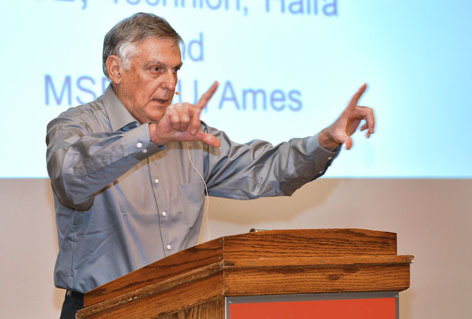
Dan Shechtman, speaking during a public lecture in the Great Hall of the Memorial Union on Wednesday, sounded more like a business professor than the winner of the 2011 Nobel Prize in Chemistry.
Shechtman said a combination of science, technology and entrepreneurship can jump start the economies of developing countries and can be a key to world peace and prosperity.
Here's a little of what he said:
- "Universities like Iowa State need to teach engineers and scientists how to open startups and infect them with the bug of entrepreneurship." (Shechtman described a class in technological entrepreneurship he’s taught in Israel for 27 years. The class attracts up to 600 students and features entrepreneurs telling the stories of their successes and failures. Shechtman also brings in professionals to talk about the law, management and marketing of startups. "I encourage people to copy what I do with this class.")
- Addressing a freshman physics student: "If you become an expert in something, you have a good chance to succeed with a startup company. Start becoming an expert in something you think is a good idea."
- "The motivation when you open a startup should be the success of the startup itself -- not money."
- "Be humble as a scientist. Be humble as an entrepreneur. Listen to other people's ideas."
Shechtman is a Distinguished Professor of materials science and engineering, a research scientist at the U.S. Department of Energy's Ames Laboratory and the Philip Tobias Distinguished Professor at the Technion -- Israel Institute of Technology. Photo by Bob Elbert.
$10 permit increase proposal goes to the regents
Meeting March 13 at Iowa State, the state Board of Regents reviewed proposed parking permit increases for the year beginning on July 1; a board vote is expected at the April meeting. Iowa State’s parking division is proposing a flat $10 increase to all permits, excluding motorcycle permits ($3 proposed increase) and an annual permit in the Memorial Union ramp ($12 proposed increase). No increase is being sought for hourly parking (meters or metered lots).
Parking revenue is used to maintain existing lots, build a reserve for additional parking and support the parking operation. Proposed changes are summarized in the table below.
Proposed parking permit increases
| Type of permit | Current | Proposed FY14 |
| 24-hour Reserved | $856 | $866 |
| Reserved | $481 | $491 |
|
General staff, Residence staff and Ames Lab staff |
$142 | $152 |
| Department | $142 | $152 |
| Vendor | $181 | $191 |
| Motorcycle | $47 | $50 |
| Memorial Union ramp | ||
| Annual | $486 | $498 |
| Fall, winter or spring | $208 | $214 |
Transparency task force
Board president Craig Lang announced the nine members of a regent system transparency task force approved last month by the board to develop a consistent protocol that can be used by the universities, the special schools and the board in responding to public information requests. Board member Nicole Carroll will chair the task force. She'll be joined by appointees from these groups:
- Governor’s Iowa Public Information Board representative: Kathleen Richardson, Iowa Freedom of Information Council and Drake University faculty member
- Executive director of the Board of Regents (designee): Patrice Sayre, chief business officer
- Iowa Senate: Sen. Jeff Danielson, Cedar Falls
- Iowa House of Representatives: Rep. Peter Cownie, West Des Moines
- University of Iowa: Mark Braun, chief of staff in the office of the president
- Iowa State University: Miles Lackey, chief of staff in the office of the president
- University of Northern Iowa: John Johnson, professor of history
- Member of the public: Jack Lashier, director of the Iowa Hall of Pride, Des Moines
The group is charged with recommending best practices for:
- Responding to public information requests
- Providing access to public information of interest to Iowans
Lang said it's not the group's responsibility to resolve legal opinions about what constitutes a public record. The study will encompass all five regent institutions and the board office in Des Moines. The task force's first report is due at the board's June meeting.
Residence, dining rates for 2013-14
Residence director Pete Englin told board members that in keeping with the university's efforts to hold education costs flat for students, Iowa State will not ask for increases to any of its residence hall, apartment or dining rates next year. The board will approve those rates at its April meeting.
Merit contract
Tom Evans, a staff attorney for the board, reported that the health insurance component of the state's two-year contract with the American Federation of State, County and Municipal Employees (AFSCME) last month went to an arbitrator, who ruled that the insurance plans and the cost structure would not change. Most of Iowa State's merit employee positions are covered by the contract.
The two sides previously reached an agreement on wage increases for the two fiscal years beginning this July 1:
- No increase (0 percent) on July 1, 2013, and July 1, 2014
- A step increase of 4.5 percent each of the two years for employees not at the maximum of their pay grades. A step increase is given on an employee's service anniversary date at Iowa State.
In other Iowa State business, the board:
- Approved a dormitory revenue bond sale totaling $25 million, with an interest rate of 2.86 percent, to cover part of the addition of seven student apartment buildings at Frederiksen Court. This is the first of two scheduled bond sales for the apartment community expansion.
- Approved the appointment of Sarah Rajala as dean of the College of Engineering and professor of electrical and computer engineering, effective April 1, at a salary of $312,000
- Received the FY12 annual report on faculty resignations (PDF). The number of Iowa State faculty resignations decreased from 33 to 26 (21 percent) between FY11 and FY12. During the past 10 years, the average number of annual faculty resignations has been 38. Faculty who leave are asked to participate in an online exit survey and a face-to-face or phone interview with the provost's office, in addition to an interview with the department chair or college dean. Fourteen of the exiting faculty last year participated in the online survey.
- Approved a request to purchase a high-performance computer cluster for approximately $1.4 million (price subject to final configuration). The cluster will consist of more than 160 16-core servers and will support research in the biosciences, bioinformatics, computational fluid dynamics modeling and other complex computing needs. Students also will receive training on the cluster. A research equipment grant from the National Science Foundation will cover the purchase.
- Was introduced to Iowa State faculty member and 2011 Nobel Prize winner Dan Shechtman, who had just concluded a university lecture in the adjoining room.
President Leath announces comprehensive diversity audit
Over the next several months, Iowa State will conduct a university-wide diversity asset inventory and audit. President Steven Leath announced the project earlier this month in a memo to university leaders.
The inventory phase is just that -- taking stock of the university's current diversity programs and initiatives. The audit phase will examine Iowa State's diversity strengths and weaknesses, creating a road map for the future.
Leath said the project will help Iowa State better understand its existing diversity assets and more efficiently align those resources so the university can effectively support and promote diversity on campus and throughout the Ames community.
“Iowa State University is as diverse as it has ever been, but we have a responsibility to build upon past successes and ensure that we strive every day to create an environment that is as welcoming as possible to all people -- regardless of race, gender or sexual orientation,” Leath said in the memo.
Iowa State produces diversity annual reports, but this upcoming audit is the most comprehensive diversity study in the university's history, according to Miles Lackey, associate vice president and chief of staff.
"The university is not only doing what's right, but we're doing it the right way," Lackey said.
Consultant help
Jerlando Jackson, founder of The Jackson Consulting Firm, Madison, Wis., and Vilas Distinguished Professor of Higher Education at the University of Wisconsin, Madison, will lead the inventory and audit. Jackson received a Ph.D. in educational leadership and policy studies from Iowa State (2000), and offered to donate his services.
Jackson and his team will use document analysis, secondary data analysis, individual interviews and focus groups with undergraduate and graduate students, faculty, staff, administrators, alumni, community representatives and others to gather data about diversity at Iowa State. Several topics will be explored throughout the information-gathering phase, including organizational culture and climate, diversity objectives, strategic planning, faculty and staff recruitment and retention, and hiring practices, to name a few.
Timing
Assembling the diversity inventory will begin March 25 and conclude in late April. The diversity audit will begin in late April and conclude in late May. A final report with recommendations will be submitted to Leath in July.
Campanile springs forward
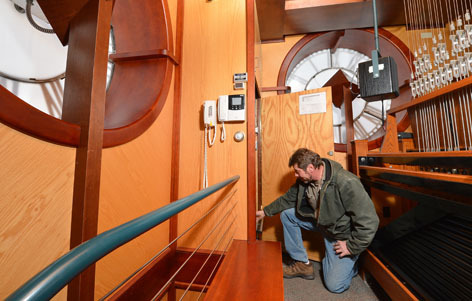
Did you climb 79 spiraling stair steps in a claustrophobic space to reprogram your clock for daylight saving time? That's what it takes to keep the four clock faces of the campanile accurate. Mark Reddish, systems control technician in facilities planning and management, uses a computer system to keep the clocks -- and the automatic lights and bell chimes -- in sync. Fortunately, it also allows him to program the switch in advance (pictured last Friday).
Sometimes a physical fix of the clock face is required, usually the result of strong winds that knock the hands off their marks. That's when it becomes a two-person job. Reddish can manually adjust the gears on each clock face independently, but he needs a coworker to confirm the correct position from an outside view. Photo by Bob Elbert.
Senate debates revisions to P&T voting, academic unit renaming policies
Several Faculty Handbook changes were introduced at the March 12 Faculty Senate meeting, including revisions to voting procedures for promotion and tenure review. Senators will vote on the handbook revisions at their April 2 meeting.
Proposed revisions to the voting policy (section 5.2.4 PDF) were first introduced in October, but the senate sent the motion back to the promotion and tenure task force for more work. Steve Freeman, chair of the task force, said the revisions are being reintroduced as new business due to the numerous changes made by his group and the senate's executive board. Revisions to the policy include clarifications of the "one person, one vote" requirement and conflicts of interest procedures.
"Since it is significantly different than what you saw in October, we did not bring it back as unfinished business," Freeman said. "There are some things that are clarifications, some things that are new and some things that are simply reworded."
Philanthropic renaming
To clarify the Faculty Handbook policy for renaming academic units (section 2.8 PDF), new language is proposed which adds an outline of the procedure for renaming an academic unit as a result of a philanthropic gift. In that situation, the faculty's role is advisory to the president's decision.
Discussion ensued, including arguments in favor of faculty consent -- rather than advice -- on renaming. Concern about the need for donor relationship-building and confidentiality also was discussed.
Other business
Three new academic programs sailed through with unanimous approval, including:
- A master of finance (College of Business)
- A bachelor of science in public relations (College of Liberal Arts and Sciences)
- A minor in landscape management (College of Agriculture and Life Sciences)
A bylaw change also was approved, exempting the terms of the past president and secretary from senate term limits. The change aligns those officer positions with the existing eligibility standards for the president and president-elect.
Eight mats of championship action
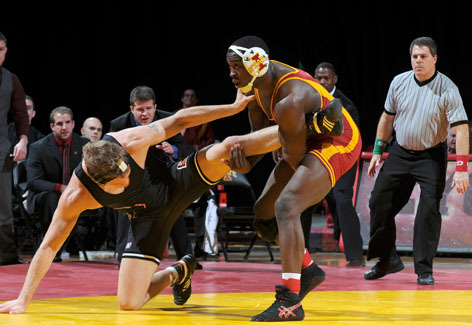
For the first time in 20 years, Iowa State will play host to the NCAA Wrestling Championships. The nation's top 330 grapplers -- 33 in 10 weight classes -- will compete March 21-23 in Des Moines' Wells Fargo Arena. Seven Cyclones earned a berth to the national championship at the Big 12 Conference meet, including 197-pound champion Kyven Gadson (pictured). All-sessions tickets have sold out, but floor tickets ($77) are available for the 6:30 p.m. Saturday finals.
Beginning March 20, a free fan festival will be held daily in Hy-Vee Hall, adjacent to the arena. Hours are 6-9 p.m. Wednesday, 10:30 a.m.-10 p.m. Thursday, and 9:30 a.m.-10 p.m. Friday and Saturday. Activities include interactive exhibits, youth clinics, autograph sessions, displays, presentations and concessions. Monitors will provide festival participants with live coverage of the championships. Photo courtesy of athletics communications.
